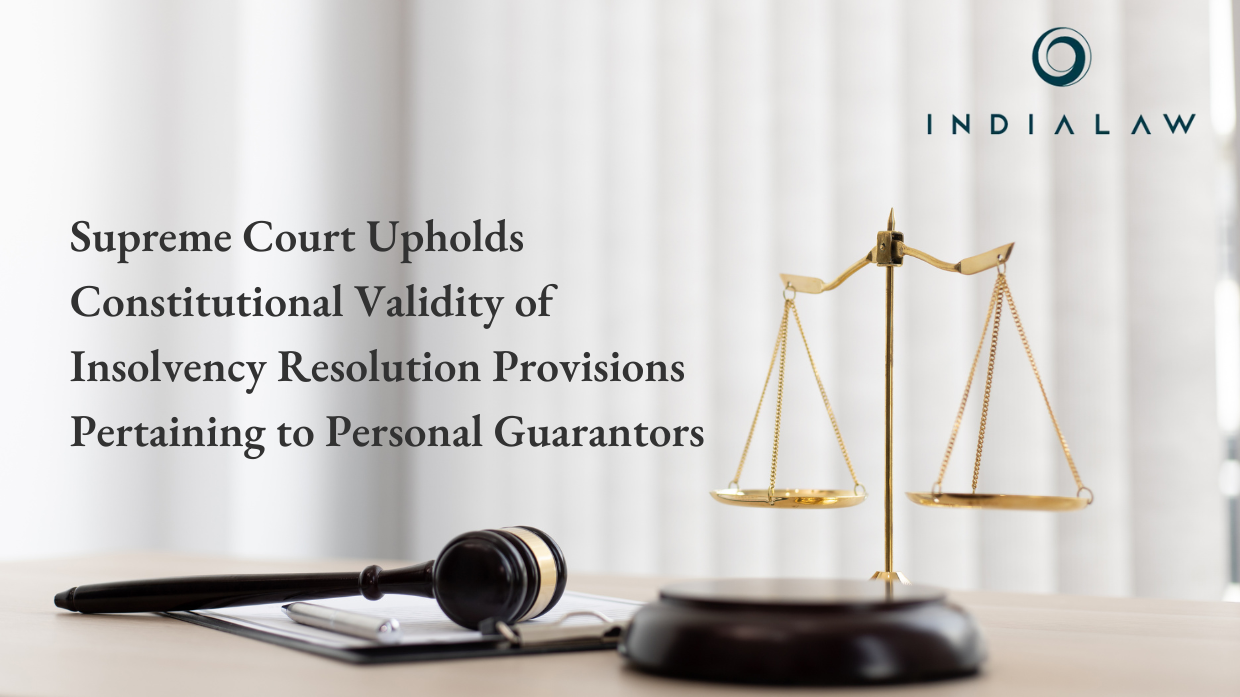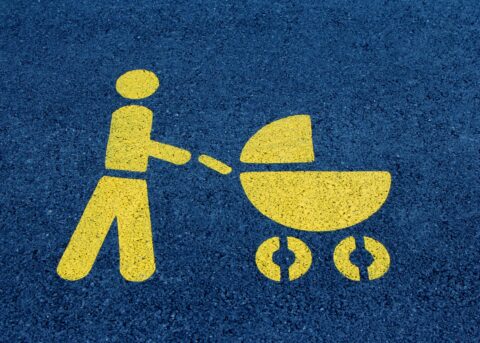Supreme Court Upholds Constitutional Validity of Insolvency Resolution Provisions Pertaining to Personal Guarantors

The Supreme Court in Surendra B. Jiwrajika and Anr. vs. Omkara Assets Reconstruction Private Limited[i] upheld the constitutionality of the provisions under Part-III, Chapter-III of the Insolvency and Bankruptcy Code, 2016 (I&B Code) pertaining to Insolvency Resolution of Personal Guarantors.
Contentions of the Petitioner
The Petitioners contested on the grounds of Sections 95(1), 96(1), 97(5), 99(1), 99(2), 99(4), 99(5), 99(6), and 100 of the I&B Code and alleged that principles of natural justice and due process was not followed. It was argued that the personal guarantor was not given any opportunity to present his case or dispute the initiation of appointment of the Resolution Professional which would render the provisions arbitrary and violative of Article 14 of the Constitution of India.
Overview of Sections that were under challenge:
Section 95 of the I&B Code allows the creditors to initiate Insolvency Proceedings against personal guarantors. It can be initiated independently or jointly or through a resolution professional. If there exist no disciplinary issues with the selection of the resolution professional, then the Adjudicating Authority will appoint the Resolution Professional to oversee the Resolution Process for the personal guarantor. Under the said provision, the personal guarantor does not get any opportunity to present their case or challenge the appointment of the Resolution Professional.
As per Section 95(2) of the I&B Code, the Resolution Professional has the discretion to ask the debtor for evidence of debt repayment as claimed by the creditor.
On filing of an application of initiation of the resolution process, Section 96 of the I&B Code imposes an interim moratorium which prohibits any coercive actions by creditors, but does not prohibit the personal guarantor from alienating or otherwise dealing with their assets.
Under Section 99 of the I&B Code, the Resolution Professional is required to review the application filed under Sections 94 or 95 within 10 days of their appointment and file a Report with the Adjudicating Authority recommending either the approval or rejection of the application.
Further, under Section 100 of the I&B Code, the Adjudicating Authority decides on whether the application ought to be admitted or rejected after hearing both the applicant/creditor, the personal guarantor and after considering the Resolution Professional’s Report. On admission of the application under Section 100 by the Adjudicating Authority, a moratorium is imposed under Section 101 of the I&B Code, which in addition to the already existing prohibitions under the interim moratorium, also prohibits the personal grantor from transferring, encumbering or disposing of their assets, legal rights, or beneficial interests.
Decision of the Supreme Court
The Supreme Court stated that Section 95 to 100 of the I&B Code cannot be held as unconstitutional for not granting an opportunity of hearing during the pre-admission stage under Section 95 to the personal guarantors while appointing the Resolution Professional, since the principle of natural justice i.e., opportunity of being heard, cannot be applied as a straight fit jacket formula and it varies on case-to-case basis.
The Supreme Court held that Section 96 interim moratorium, which applies from the date of filing of the insolvency petition, is protective in nature as it insulates the personal guarantor from the legal actions arising out of the debt until the insolvency application is finally heard under Section 100 of the I&B Code.
The Supreme Court clarified that since there was no manifest arbitrariness in the law, the Court would not attempt to rewrite clear legislative mandate, and observed as follows:
“The statute (IBC) does not suffer from any manifest arbitrariness to violate Art 14 of the Constitution”.
“It cannot read an adjudicatory role into these provisions and that the entire process of timelines would be rendered negatory if the role of adjudicator is changed. For the Court to change the adjudicatory role envisaged under these provisions would amount to “rewriting the legislative functions”.
The Supreme Court also clarified that a recommendatory report by the Resolution Professional does not have a binding effect, and therefore it cannot be said that the Resolution Professional has been confer adjudicatory powers. Section 99 of the I&B Code requires the Resolution Professional to only act as a facilitator gathering relevant information and to recommend acceptance or rejection of application, and the actual adjudication commences under Section 100 of the I&B Code by the Adjudicating Authority, after the Resolution Professional has submitted their report.
This landmark judgement of the Supreme Court is instrumental in bringing in much-needed clarity to the nascent area of personal insolvency laws in India. It is pertinent to note that Part-III, Chapter -III of the I&B Code is currently applicable only to personal guarantors to corporate debtors.
[i] SLP(C) No. 016464/2021 + connected matters
By entering the email address you agree to our Privacy Policy.



